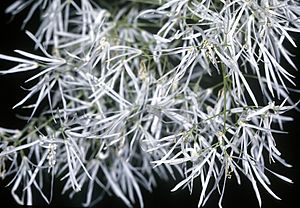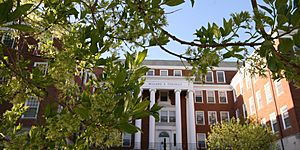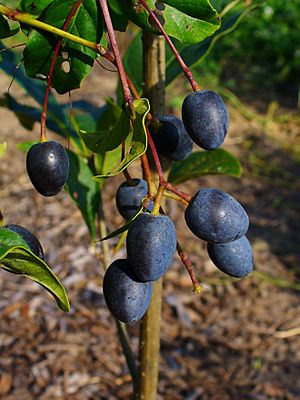White fringetree facts for kids
Quick facts for kids White fringetree |
|
|---|---|
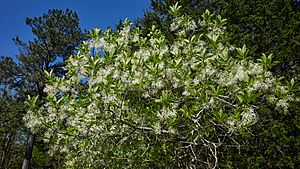 |
|
| Conservation status | |
| Scientific classification | |
| Genus: |
Chionanthus
|
| Species: |
virginicus
|
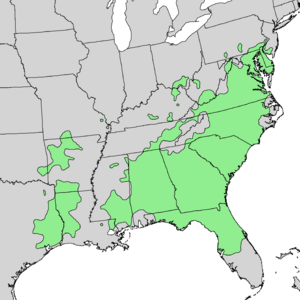 |
|
Chionanthus virginicus, also known as the white fringetree, is a beautiful tree that grows naturally in the southeastern United States. You can find it in savannas and lowlands from New Jersey all the way south to Florida, and west to Oklahoma and Texas.
Contents
What Does the White Fringetree Look Like?
The white fringetree is a deciduous shrub or a small tree. This means it loses its leaves in the fall. It can grow up to 10 to 11 meters (about 33 to 36 feet) tall, but it is usually smaller.
Its bark is scaly and brown with a hint of red. The new branches, called shoots, are light green at first. They later turn light brown or orange. The buds are small, light brown, and shaped like an egg.
Leaves and Flowers
The leaves grow opposite each other on the branch. They are simple, meaning each leaf has one blade. They are oval or oblong, about 7.5 to 20 cm (3 to 8 inches) long. The leaves are smooth on top and slightly fuzzy underneath, especially along the veins. In the fall, they turn a bright yellow color.
The white fringetree is famous for its beautiful, sweet-smelling flowers. They are pure white and have four long, thin petals, like threads. These flowers grow in hanging clusters, called panicles, that are 10 to 25 cm (4 to 10 inches) long. They appear in mid to late May in cooler areas, and earlier in the southern states.
Fruits and Seeds
Most white fringetrees are dioecious. This means that individual trees usually have either male or female flowers, but not both. Sometimes, a tree might have both types of flowers.
The fruit is a dark blue to purple, oval-shaped drupe. It is about 1.5 to 2 cm (0.6 to 0.8 inches) long. Each fruit usually holds one seed, but sometimes it can have two or three. The fruits ripen in late summer to mid-fall.
Why is it Called That?
The scientific name Chionanthus virginicus comes from the way the plant was first described. The name Chionanthus means "snow flower" in Greek, which perfectly describes its white, delicate blooms.
Sometimes, people in the Appalachian mountains call this tree "Grancy Gray Beard" or "Old Man's Beard." These fun names also refer to its long, white, beard-like flowers.
How People Use White Fringetrees
Even though it grows naturally in the southeastern U.S., the white fringetree can handle cold weather. This makes it a popular choice for gardens in many places. Gardeners often grow them with several trunks to create a fuller look. The white flowers look best when you view them from below.
In the fall, the leaves turn a lovely clear yellow. This color looks great next to plants with darker leaves or evergreens. The tree likes moist soil and a spot that is protected from strong winds.
Traditional Uses
Long ago, Native Americans used parts of the white fringetree for medicine. They would dry the roots and bark. Then, they used them to help treat skin problems. Crushed bark was also used on sores and wounds to help them heal.
Threats to White Fringetrees
In 2014, scientists found a serious pest attacking white fringetrees in Ohio. This pest is called the emerald ash borer. It is an insect from Asia that has caused a lot of damage to ash trees in North America.
Since then, the emerald ash borer has been found on white fringetrees in other states like Illinois, Indiana, and Pennsylvania. This shows that the insect is now attacking white fringetrees in many areas where both species live. When a white fringetree is infested, its top branches might start to die. New shoots might also grow from the trunk or lower branches.
See also
 In Spanish: Cionanto para niños
In Spanish: Cionanto para niños



